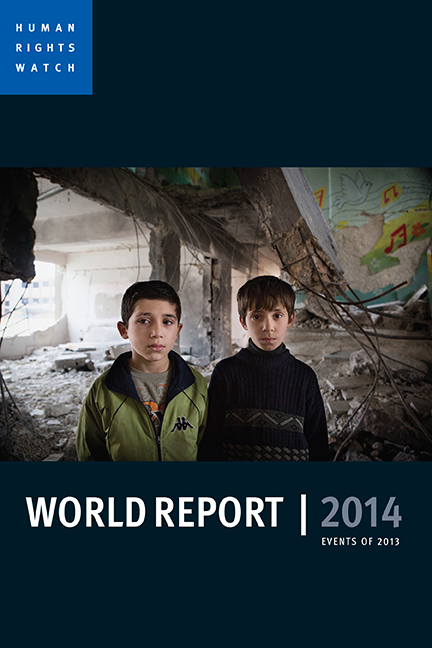Book contents
- Frontmatter
- Dedication
- HUMAN RIGHTS WATCH
- Table of Contents
- Foreword
- Rights Struggles of 2013: Stopping Mass Atrocities, Majority Bullying, and Abusive Counterterrorism
- The Human Rights Case for Drug Reform How Drug Criminalization Destroys Lives, Feeds Abuses, and Subverts the Rule of Law
- Putting Development to Rights: Integrating Rights into a Post-2015 Agenda
- The Right Whose Time Has Come (Again) Privacy in the Age of Surveillance
- Photo Essays
- AFRICA
- AMERICAS
- ASIA
- EUROPE AND CENTRAL ASIA
- MIDDLE EAST AND NORTH AFRICA
- UNITED STATES AND CANADA
- 2013 HUMAN RIGHTS WATCH PUBLICATIONS
- Acknowledgments
- Frontmatter
- Dedication
- HUMAN RIGHTS WATCH
- Table of Contents
- Foreword
- Rights Struggles of 2013: Stopping Mass Atrocities, Majority Bullying, and Abusive Counterterrorism
- The Human Rights Case for Drug Reform How Drug Criminalization Destroys Lives, Feeds Abuses, and Subverts the Rule of Law
- Putting Development to Rights: Integrating Rights into a Post-2015 Agenda
- The Right Whose Time Has Come (Again) Privacy in the Age of Surveillance
- Photo Essays
- AFRICA
- AMERICAS
- ASIA
- EUROPE AND CENTRAL ASIA
- MIDDLE EAST AND NORTH AFRICA
- UNITED STATES AND CANADA
- 2013 HUMAN RIGHTS WATCH PUBLICATIONS
- Acknowledgments
Summary
The fragile transition government that succeeded President Ali Abdullah Saleh in 2012 following mass protests failed to address multiple human rights challenges. Conflict-related abuses, legally sanctioned discrimination against women, judicial executions of child offenders, and non-accountability for the previous government's human rights violations all persisted in 2013.
Five hundred and sixty five representatives of political parties, women, youth, and civil society launched a national dialogue process in March, which was slated to produce recommendations within six months to guide the subsequent constitutional drafting process regarding the nature of the state. At time of writing, the dialogue had yet to end because of delays caused by political maneuvering.
Clashes continued between state security forces and armed factions demanding greater autonomy in southern Yemen and between Salafist groups and armed tribesmen and Huthis in the north. The Yemeni government and the United States continued to engage in military operations with the Islamist armed group Al-Qaeda in the Arabian Peninsula (AQAP). On December 5, suicide bombing attacks both claimed and denied by AQAP against Yemen's Defense Ministry compound killed at least 52 people and injured another 161. The dead included at least seven foreign doctors and nurses working at the military hospital in the compound.
Yemen faces a growing humanitarian crisis, with nearly half the population lacking sufficient food, according to UN agencies.
Accountability
In 2012, Yemen's parliament granted Saleh and his aides immunity from prosecution, and the current president, Abdu Rabu Mansour Hadi, has not created mechanisms to provide accountability for past abuses.
In September 2012, President Hadi decreed that an independent commission of inquiry should be created to investigate alleged violations committed during the 2011 uprising and recommend accountability for perpetrators and redress for victims. Over one year later, he had still not nominated the commissioners.
Hadi presented a deeply flawed draft transitional justice law to parliament in January, but it has yet to be passed. The draft law does not grant victims judicial redress, but is merely a victim compensation scheme, limited in time to events of 2011.
The trial began in September 2012 of 78 defendants—but not the key suspects—for the deadliest attack of the uprising, in which pro-government gunmen killed 45 protesters and wounded 200 on March 18, 2011. It was marred by political interference, failure to follow leads that might have implicated government officials, and factual errors.
- Type
- Chapter
- Information
- World Report 2014Events of 2013, pp. 626 - 634Publisher: Bristol University PressPrint publication year: 2014

